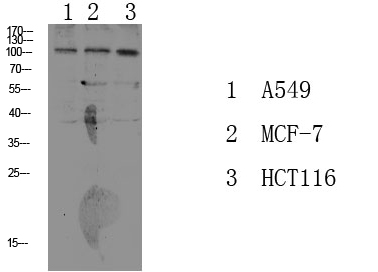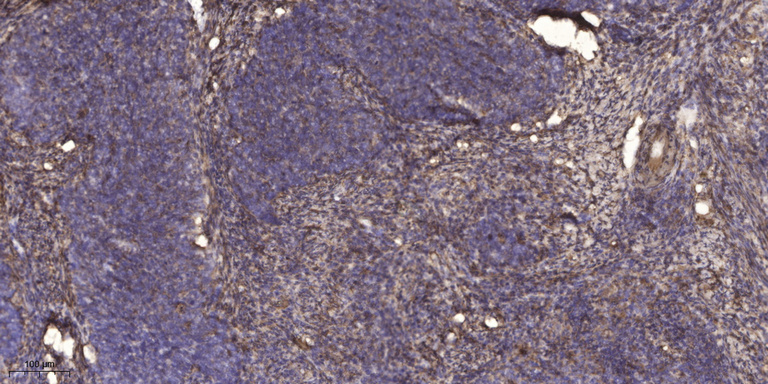Na+/K+-ATPase α1 (Phospho Tyr260) Polyclonal Antibody
- Catalog No.:YP1226
- Applications:WB;IHC
- Reactivity:Human;Mouse;Rat
- Target:
- Na+/K+-ATPase α1
- Fields:
- >>cGMP-PKG signaling pathway;>>cAMP signaling pathway;>>Cardiac muscle contraction;>>Adrenergic signaling in cardiomyocytes;>>Insulin secretion;>>Thyroid hormone synthesis;>>Thyroid hormone signaling pathway;>>Aldosterone synthesis and secretion;>>Aldosterone-regulated sodium reabsorption;>>Endocrine and other factor-regulated calcium reabsorption;>>Proximal tubule bicarbonate reclamation;>>Salivary secretion;>>Gastric acid secretion;>>Pancreatic secretion;>>Carbohydrate digestion and absorption;>>Protein digestion and absorption;>>Bile secretion;>>Mineral absorption
- Gene Name:
- ATP1A1
- Protein Name:
- Sodium/potassium-transporting ATPase subunit alpha-1 (Na(+)/K(+) ATPase alpha-1 subunit) (EC 3.6.3.9) (Sodium pump subunit alpha-1)
- Human Gene Id:
- 476
- Human Swiss Prot No:
- P05023
- Mouse Gene Id:
- 11928
- Mouse Swiss Prot No:
- Q8VDN2
- Rat Gene Id:
- 24211
- Rat Swiss Prot No:
- P06685
- Immunogen:
- Synthesized phospho derived from human Na+/K+-ATPase α1 (Phospho-Tyr260) Polyclonal
- Specificity:
- This antibody detects endogenous levels of Na+/K+-ATPase α1 (Phospho-Tyr260).
- Formulation:
- Liquid in PBS containing 50% glycerol, 0.5% BSA and 0.02% sodium azide.
- Source:
- Polyclonal, Rabbit,IgG
- Dilution:
- WB 1:500-2000;IHC 1:50-300
- Purification:
- The antibody was affinity-purified from rabbit antiserum by affinity-chromatography using epitope-specific immunogen.
- Concentration:
- 1 mg/ml
- Storage Stability:
- -15°C to -25°C/1 year(Do not lower than -25°C)
- Other Name:
- Sodium/potassium-transporting ATPase subunit alpha-1 (Na(+)/K(+) ATPase alpha-1 subunit) (EC 3.6.3.9) (Sodium pump subunit alpha-1)
- Observed Band(KD):
- 115kD
- Background:
- The protein encoded by this gene belongs to the family of P-type cation transport ATPases, and to the subfamily of Na+/K+ -ATPases. Na+/K+ -ATPase is an integral membrane protein responsible for establishing and maintaining the electrochemical gradients of Na and K ions across the plasma membrane. These gradients are essential for osmoregulation, for sodium-coupled transport of a variety of organic and inorganic molecules, and for electrical excitability of nerve and muscle. This enzyme is composed of two subunits, a large catalytic subunit (alpha) and a smaller glycoprotein subunit (beta). The catalytic subunit of Na+/K+ -ATPase is encoded by multiple genes. This gene encodes an alpha 1 subunit. Multiple transcript variants encoding different isoforms have been found for this gene. [provided by RefSeq, May 2009],
- Function:
- catalytic activity:ATP + H(2)O + Na(+)(In) + K(+)(Out) = ADP + phosphate + Na(+)(Out) + K(+)(In).,function:This is the catalytic component of the active enzyme, which catalyzes the hydrolysis of ATP coupled with the exchange of sodium and potassium ions across the plasma membrane. This action creates the electrochemical gradient of sodium and potassium ions, providing the energy for active transport of various nutrients.,PTM:Phosphorylation on Tyr-10 modulates pumping activity.,similarity:Belongs to the cation transport ATPase (P-type) family.,similarity:Belongs to the cation transport ATPase (P-type) family. Type IIC subfamily.,subcellular location:Identified by mass spectrometry in melanosome fractions from stage I to stage IV.,subunit:Composed of three subunits: alpha (catalytic), beta and gamma. Binds the HLA class II histocompatibility antigen, DR1.,
- Subcellular Location:
- Basolateral cell membrane ; Multi-pass membrane protein . Cell membrane, sarcolemma ; Multi-pass membrane protein . Cell projection, axon . Melanosome . Identified by mass spectrometry in melanosome fractions from stage I to stage IV. .
- Expression:
- Brain,Cerebellum,Cervix,Placenta,Retinal pigment epithelium
- June 19-2018
- WESTERN IMMUNOBLOTTING PROTOCOL
- June 19-2018
- IMMUNOHISTOCHEMISTRY-PARAFFIN PROTOCOL
- June 19-2018
- IMMUNOFLUORESCENCE PROTOCOL
- September 08-2020
- FLOW-CYTOMEYRT-PROTOCOL
- May 20-2022
- Cell-Based ELISA│解您多样本WB检测之困扰
- July 13-2018
- CELL-BASED-ELISA-PROTOCOL-FOR-ACETYL-PROTEIN
- July 13-2018
- CELL-BASED-ELISA-PROTOCOL-FOR-PHOSPHO-PROTEIN
- July 13-2018
- Antibody-FAQs
- Products Images

- Western blot analysis of various lysate, antibody was diluted at 1000. Secondary antibody(catalog#:RS0002) was diluted at 1:20000

- Immunohistochemical analysis of paraffin-embedded human cervical carcinoma. 1, Antibody was diluted at 1:200(4° overnight). 2, Tris-EDTA,pH9.0 was used for antigen retrieval. 3,Secondary antibody was diluted at 1:200(room temperature, 45min).



